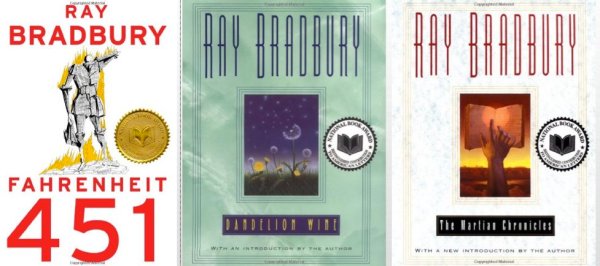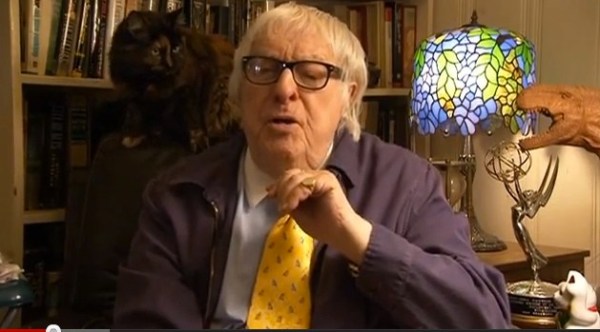
Ray Bradbury has died at 91. His story telling and dreams of the future captured generations of science fiction followers in the 20th century, but as he often said, he was a speculative writer, and often, the time was now, or then, or on its way, in the hearts and minds of us, rather than in some future extravaganza of technology.
There are so many recurring themes in his stories that they swirl in and out of focus, especially so in his earlier short stories, some found in The Machineries of Joy and The Martian Chronicles.
An abiding memory for this reader is that of the boy who never grew old, who appears in a number of his writings, and is part of the theme that to find the aliens, the cosmic anthropologists who are here, to observe and report, one must go to their safest place, the Circus, and the freak shows of Side Show Alley at a state fair ground.
To this reader, Bradbury is part of a broad and deep genre of American story telling that includes the truant adventures of Tom Sawyer and Hucklberry Finn told by Mark Twain, evoking the great river, flowing past the woodland setting of the effigy mounds on the banks of the Mississipi near Monona, or wandering into corners of the Rock Island Line museum station at Dows in Iowa. Its sweep includes the hypnotic horror of the stories of Edgar Allan Poe and Stephen King, yet also the optimism and marvel of middle America after World War II.
Bradbury speaks about a time and place where huge trains seemingly miles long shuddered to a halt beside small towns lost in a sea of wheat fields, to pick up one or two passengers to ride to the big cities, rather than catch jets, where they would work on rockets that would travel to the stars.
He speaks about The drummer boy at Shiloh, as much as endless cosmic adventures in starry empires, a short story in which Bradbury turns but a few pages that lead the curious, or transfixed, into the shocking past, but a past that is for the 20th century reader, still in a 19th century Civil War future, the day before slaughter and mayhem.
In this broad sweep of observation and fantasy or speculative writing you will find a small town, late at night, when the Circus is leaving. Its floats and cages and exhibits proceed along the empty streets, the leaves swirl, almost it seems to the beat of a single drum, and the boy slips out of the house, avoiding his parents watching from the porch, and runs after the Circus.
It reaches the ‘city limits’ as towns always called them, where the street lights cease, and the stars come down to meet the black top of the road, and one by one, the Circus carriages fold up into themselves, and disappear, taking the curious boy with them.
Years later, the Circus comes to town again. Not much has changed, except that Ma and Pa are pretty old, sitting on the same porch seat, as the floats glide by, and the drummer drums. And the boy walks up from the windy, leafy shadows, and they call him by name ….Is that you? And it is. But it is late, very late, and their boy, if I recall correctly, takes them away with him, catching up with the Circus, as it comes to the place where the stars fall down to meet the unseen ground, in the place where they leave the city limits.

One of many You Tube video interviews with Ray Bradbury can be seen here.







Crikey is committed to hosting lively discussions. Help us keep the conversation useful, interesting and welcoming. We aim to publish comments quickly in the interest of promoting robust conversation, but we’re a small team and we deploy filters to protect against legal risk. Occasionally your comment may be held up while we review, but we’re working as fast as we can to keep the conversation rolling.
The Crikey comment section is members-only content. Please subscribe to leave a comment.
The Crikey comment section is members-only content. Please login to leave a comment.